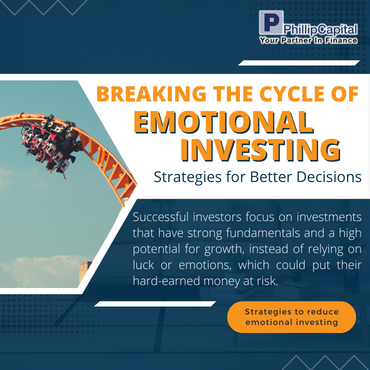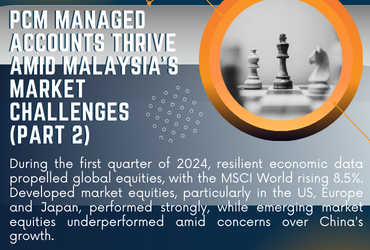
Emotions can play a crucial role in investment decision making among investors. Most investors tend to base their decisions on their emotional reactions to numerous market circumstances, which might result in irrational decisions. In stocks market for instance, one of the most common emotional responses that affect investment decisions is the fear of missing out (FOMO), which can cause individuals to buy high and sell low. Some investors may cling onto lost stocks for a long time in the hopes that the price will rise if they are unwilling to cut their losses. While it is natural to hope for a rebound in stock prices, the reality is that some stocks may never recover, and waiting too long to sell can lead to significant losses.
This behaviour may be explained by loss aversion.
Loss aversion is a well-established concept in behavioural economics, with significant implications for investment decisions. It is a cognitive bias that refers to an investor’s tendency to be more strongly influenced by the potential of losses rather than the potential of gains. This tendency can lead to emotionally driven investment decisions, as people may prefer to hold onto losing investments rather than sell them in order to avoid the pain of loss, even if selling would be the more rational decision for their portfolio. Ultimately, a person’s capacity to make rational decisions is significantly hampered when they are under emotional stress.
The herd instinct hinders rational investing.
The term “herd instinct” refers to an individual’s tendency to conform to the behaviours or opinions of a larger group. It can lead to irrational investment decisions like selling out of panic during a market drop or adhering to passing market trends. Instead of completing their own research or analysis, investors could be swayed by the actions of others, resulting in suboptimal investment decisions that are not aligned with an individual’s financial goals or risk tolerance.
Insufficient research in investment is a risky action.
Investors who adopt a speculative mindset often base their investment decisions on instinct, emotions, and luck, without conducting thorough research and analysis. This can lead to significant gains or losses. On the other hand, successful investors focus on investments that have strong fundamentals and a high potential for growth, instead of relying on luck or intuition, which could put their hard-earned money at risk.
How to keep one’s emotions out of the way?
Several techniques can be employed to prevent emotional decision-making. The most important is to remember that anxiety during turbulent market stretches is common and natural, and not something investors need to act on. Other useful strategies for minimising emotional influence on investments include:
- Understand what you are investing and invest with fundamentals.
Investors must understand the nature and volatility of each asset class to make informed investment decisions. Equities are known for their high volatility, while bonds are generally considered to be less volatile. On the other hand, commodities, such as gold and oil, can be highly volatile, with prices being affected by factors such as weather conditions, geopolitical events, and supply and demand.
- Proper goal setting is the key.
Investors must understand their risk tolerance, time horizon, and investment objectives, as well as how these factors fit into their overall financial picture. By reviewing these objectives on a regular basis, investors can have an up-to-date guide for any significant portfolio adjustments. This could also serve as a reminder to be patient and resist the urge to react to short-term fluctuations in investments.
- Investors should invest with data, not emotions.
Investors can help to reduce the risk of losses and increase the likelihood of achieving their financial goals by adopting a disciplined and rational approach to investing. Furthermore, emotional responses can be mitigated through proper risk management, such as the use of stop-loss orders or the diversification of investments. A well-diversified portfolio with non-correlated asset classes can help reduce volatility and the emotions that come with it.
- Sufficient liquidity
Maintaining a sufficient cash reserve to cover living expenses for at least three to five years can offer a sense of security during market volatility. This approach helps to avoid the need to sell high-quality stocks at reduced values to meet current financial needs.
- Engage with a professional investment firm to assist with your investment decisions.
Engaging with a professional investment firm can offer a range of benefits, including access to investment opportunities, expert guidance, and comprehensive financial planning services, which can help investors identify and achieve their long-term financial goals.
Phillip Capital Malaysia offers a comprehensive suite of financial services including stockbroking, fund management, unit trusts, financial planning, financial advisory, and investment advice. We also provide a comprehensive list of portfolios that may suit your investment preferences and financial goals, which were discussed in our previous article.
Please click on the link to learn more or email us at cse.my@phillipcapital.com.my if you require any further information.
Disclaimer:
The information contained herein does not constitute an offer, invitation or solicitation to invest in Phillip Capital Management Sdn Bhd (“PCM”). This article has been reviewed and endorsed by the Executive Director (ED) of PCM. This article has not been reviewed by The Securities Commission Malaysia (SC). No part of this document may be circulated or reproduced without prior permission of PCM. This is not a collective investment scheme / unit trust fund. Any investment product or service offered by PCM is not obligations of, deposits in or guaranteed by PCM. Past performance is not necessarily indicative of future returns. Investments are subject to investment risks, including the possible loss of the principal amount invested. Investors should note that the value of the investment may rise as well as decline. If investors are in any doubt about any feature or nature of the investment, they should consult PCM to obtain further information including on the fees and charges involved before investing or seek other professional advice for their specific investment needs or financial situations. Whilst we have taken all reasonable care to ensure that the information contained in this publication is accurate, it does not guarantee the accuracy or completeness of this publication. Any information, opinion and views contained herein are subject to change without notice. We have not given any consideration to and have not made any investigation on your investment objectives, financial situation or your particular needs. Accordingly, no warranty whatsoever is given and no liability whatsoever is accepted for any loss arising whether directly or indirectly as a result of any persons acting on such information and advice.




